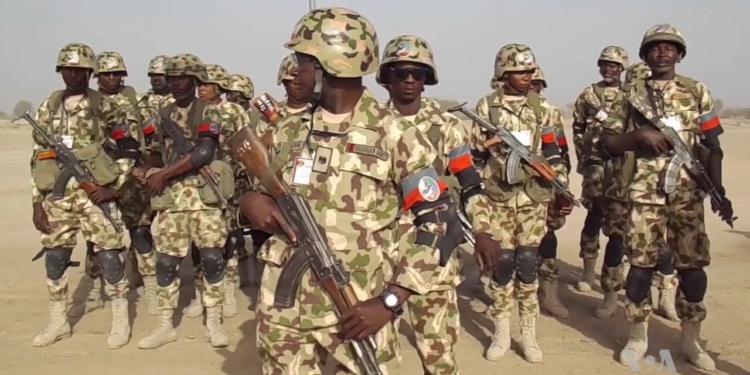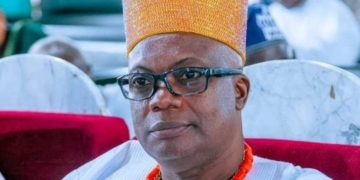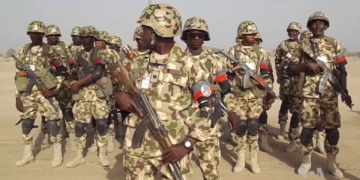The spate of insecurity in Nigeria has elicited concern from various stakeholders. The activities of Boko Haram insurgents, militant groups, armed bandits, kidnappers and other forms of criminalities have indeed tasked our security agencies. Not only has the continued state of insecurity threatened the very fabric of national integration in the country and created the ecology of fear, disquiet and anxiety, it has also called to question to the role of the various security agencies in the country.
Investigations revealed that the deployment of the Army in Internal Security Operations has dramatically increased since the return to democratic governance in Nigeria. Another factor that is responsible for the excessive deployment of the Army on ISOs is the fact that the Nigeria Police Force that is constitutionally charged with the responsibility of tackling internal security challenges is mostly poorly funded, ill-equipped and ill-trained to handle them.
These factors have often made civilian authorities to heavily rely on the expertise of the Army and its sisters’ forces, the navy and air-force to manage internal security challenges. In effect, the regular engagements of its personnel have made the organization to assume the position of the first line of internal security defence which ordinarily is the role of the police.
In an article published by the International Crisis Group, it was stated that since assuming office in May 2015, President Muhammadu Buhari appointed new and more competent service chiefs, relocated the military command centre dedicated to the fight against Boko Haram to the northeast and probed past weapons procurement.
“These actions have had salutary effects, but the benefits will be short-lived unless they are followed by formulation and implementation of a comprehensive reform program that encompasses the entire defence management spectrum, including leadership, oversight and administration. Failure to implement such reforms would leave the military distressed and Nigerians vulnerable to the current and future security challenges.”
The effectiveness of the Nigerian Army in Internal Security Operations in Nigeria has also been commendable according to findings. The various operations involve the massive deployment of military assets and manpower and are being carried out simultaneously at a period of dwindling national revenue and protracted war against terrorism and insurgency, thereby stretching the Military too thin. Regardless of this fact, the Nigerian Army has indeed proved reliable as evident in the success of its various internal security operations taking place around the country simultaneously.
In all these multiple facts indicates that the Nigerian Army remains instrumental in addressing the various security challenges in the country and its exploits in recent times have indeed endeared it in the heart of Nigerians that jump at any given opportunity to be a part of a well repositioned Nigerian Army.
According to available statistics, the various Nigerian Army recruitment has been overly subscribed by young Nigerians desirous of adorning the Nigerian Army uniform into the officers and soldiers’ cadre. According to a former commandant of the Nigerian Army Depot in Jaji, Kaduna state, he stated that the rush to join the Nigerian Army in the past five years has been phenomenal.
“As commandant of the Nigerian Army Depot, we were inundated daily with the request for enrolment into the Nigerian Army. And the instances where recruitment was conducted, those that were lucky to be enlisted during training do exhibit a burning passion that is quite impressive. Throughout my stay as the commandant, I would say that I have not seen a situation where there is such much excitement on the faces of young boys and girls.”
It was also discovered that the same experience is the case in the Nigerian Defence Academy, where cadet officers are training. Our findings revealed that the Nigerian Army always comes top as the Service for preference for cadets in training.
According to a professor of criminology from the Nigerian Defence Academy Kaduna, he stated that the Nigerian Army remains the most sought after security agency in Nigeria and retaining it as the pride of the nation.
“We must understand the complexities of crime and criminality in a country as diverse as Nigeria. Despite the avalanche of conspiracies against its operations wherein it has been mischievously propounded in sections of the country that troops of the Nigerian Army are demoralized and deserting the Army. The reverse is indeed the case. Applications have continued to pour in and those placed on reserve list exhibit as much excitement as those recruited.”
“From our findings, the urge to join the Nigerian Army is as a result of the various innovations introduced in the past five years. With improved training and doctrine, welfare and other additional incentives make the Nigerian Army the most sought after security agency in Nigeria.”
Findings also indicate that in the past five years, the welfare of troops has received much-needed attention. Salaries and allowances have been reviewed and promptly paid. It has been established that these and many more innovations introduced has indeed boosted the morale of the troops engaged in the various counterinsurgency and internal security operations of the Nigerian Army across Nigeria.
The operations of the Nigerian Army have also received commendations for its adherence to best practices. According to the International Committee of the Red Cross, detention facilities under the purview of the Army meet international standards. Head of ICRC delegation in Nigeria, Mr Karl Mattli, who made the assessment, went further to offer additional support to the Army in sustaining this standard.
There is no gainsaying that the Nigerian Army has thus regained its place of pride as an institution where discipline and professionalism is the watchword. One must also recognize and commend the fact that our officers and soldiers are now motivated to do what they have committed to doing for the country. This supports the ranking of Nigeria as the 4th country with the strongest Army in Africa due to the successes recorded in peacekeeping missions and the fight against terrorism.
Nigeria has also been ranked 43rd strongest Military in the world in 2020 by the Global Fire Power, especially in finance, logistics and defence budget. The implication of the ranking is the fact that there has been the considerable introduction of transparency and accountability, unlike in times past where monies meant for military operations were diverted to private pockets.
Findings from this ranking revealed that the regime of transparency and accountability is also a significant factor responsible for the repositioning of the Nigerian Army as a professional fighting force. Credit must indeed be given to the leadership strides of the army authorities, especially since 2015 when President Muhammadu Buhari assumed leadership of the country.
The conclusion derived from this investigation is that the Nigerian Army of today remains committed in the preservation of the territorial integrity of the country as well as addressing the various security challenges in the country. The various indices indeed point to the exploits of the Chief of Army Staff, Lt. Gen. Tukur Buratai whose giant strides have indeed positioned the Nigerian Army for exploits.
The narrative that the Nigerian Army is desolate is false; instead, it is bustling with activities. This position was confirmed during the Nigerian Army Day celebration 2020 where the Chief of Army Staff inaugurated several projects across the eight divisions of the Nigerian Army. Consequently, the bulk of the negative attribution to the operational effectiveness of the Nigerian Army in Nigeria is propaganda and not a reflection of the reality on the ground as the Nigerian Army remains highly sought after amongst the various security agencies in Nigeria.






Discussion about this post